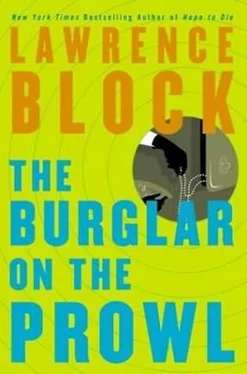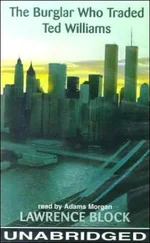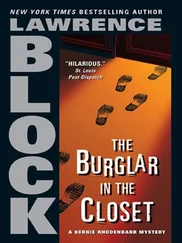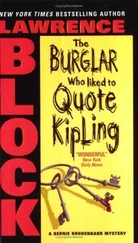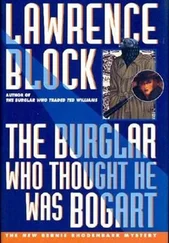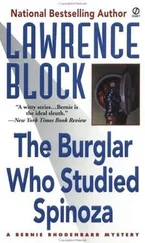"What's on the other side of the milk chute?"
"I'll be able to tell you later. But what's usually there is a closet."
"Suppose it's locked?" I gave her a look. "Sorry, Bern, I forgot who I was talking to. If it's locked you'll unlock it. Suppose, well, suppose you can't get through the thing after all?"
"Then I'll come back out," I said, "and think of something else, and if there's nothing else to think of then we'll go back home and call it a night."
If you can get your head through an opening, the rest of the body can follow.
That's a basic guideline, and it's obviously not universally applicable. If you weigh four hundred pounds, your head is going to slip through apertures that will balk at accepting your hips. (I considered the fat man who'd overpaid so generously forThe Secret Agent. A camel would fit more easily through the eye of a needle, I thought, than would he through a milk chute.)
It's a good general principle, however, and newborns prove it every day. Raffles seems to know it instinctively; if his whiskers clear an opening he'll follow them through, and if they don't he'll step back and think of another way to go, or decide he didn't really want to go there anyway.
The Mapes milk chute was large enough to accommodate my head, whiskers and all. I put on my gloves and got down to business.
The milk chute had a little catch that you turn prior to pulling the door open. It's not a lock, just a device to keep the thing from swinging open in the wind. The catch didn't want to turn, though, and then the door didn't want to open. Time and paint had made them both stuck in their ways, but a little pressure (and the tip of a knife blade) led them to change their attitude.
The chute's inner door had a catch as well, but it was on the side away from me, to be opened by the person retrieving the milk. I had my tools in hand, and a thin four-inch strip of flexible steel slipped the catch as if it had been designed for that specific purpose. The inner door opened, but when I pushed it I felt resistance before it had swung inward more than a few inches. It was a yielding, spongy sort of resistance; I could force the door farther open, but when I let go it would spring back.
I used my little flashlight, and saw right away what the problem was. The milk chute opened into a closet, as I'd expected, and the resistance was being supplied by an overcoat.
I reached a hand in, shifted things around, and created enough of a space for the door to swing all the way open. I returned my tools and penlight to my pocket, kept the sheer Pliofilm gloves on, and then proceeded to poke my head into the opening and follow it with as much as possible of the rest of me. I drew my shoulders in, making myself as narrow and eel-like as possible, said a quick and urgent prayer to St. Dismas, and commenced wriggling and squirming for all I was worth.
And I have to say it brought it all back. Not just that first magical moment of youth, when I'd thrilled at having discovered a way to get into a house I'd been locked out of. There was nothing illicit or dangerous about that first time, I'd been locked out by sheer accident and had every right and reason to be inside, but the thrill had been there from the beginning, and everything that came after grew out of that initial venture.
In no time at all I was playing with locks and teaching myself how to open them, sending away to the correspondence schools that advertised in Popular Science and enrolling in their locksmithing courses, pressing my mom's house key in a bar of soap and filing a duplicate to match the impression.
And if I hadn't been locked out that fateful afternoon, would I have escaped a life of crime? Somehow I doubt it. There are, as far as I know, no felons swiping peaches from the family tree. Both the Grimeses and the Rhodenbarrs boast generations of law-abiding folk, content to play by the rules and trade an honest day's work for an honest day's pay. I, on the other hand, am a born thief, the sort of reprehensible character of whom it is said that he'd rather steal a dollar than earn five. (That's not literally true, I'm nowhere near that bad, but I'd certainly rather steal five dollars than earn one.) And I do possess an innate knack for getting into places designed to keep me out. I studied locks, I practiced opening them, but the lessons came easy to me. It is, I blush to admit, a gift.
I don't often think back to those early days, but then I don't often crawl through milk chutes. So I let all of this go through my mind, and it was a mind that might have been better occupied with the task of getting through the milk chute as quickly as possible. Because, as you can readily appreciate, one is at one's most vulnerable during the transitional interval when one is neither inside nor outside of the house. If someone were to come along while my head was in the coat closet and my legs suspended above the driveway, I'd be hard put to explain what I was doing there and unable to run off and do it somewhere else.
But I couldn't hurry through, because I'd somehow reached a point, half in and half out, where I'd achieved an undesirable state of equilibrium, an unwelcome stasis. Wriggling and squirming weren't getting me anywhere, and I couldn't grab onto something and pull myself through because, damn it to hell, I'd put my arms at my sides in order to fit my shoulders through, and now my arms were pinned there by the sides of the milk chute.
All I had to do, I told myself, was the right sort of wriggling. If I set about squirming in an ergonomically sound manner, so as to build up a little momentum, why in no time at all…
Hell.
It wasn't working.
For God's sake, was this how it was going to end? Half in and half out of somebody else's house, unable to move in either direction, with nothing to do until Mapes and his wife came home and called the cops? If this had happened when I first tried this stunt, back in my pre-salad days, my whole career in burglary might have ended before it had begun. If it hadn't happened then, why did it have to happen now?
I might have had further thoughts on the matter, might even have enjoyed the irony of it all, but right about then a pair of hands came along and grabbed me by the ankles.
I hadn't heard a car, hadn't heard so much as a footfall. My head was in the closet, literally if not figuratively, with coats and other outerwear all around it, so that would tend to muffle the sound. And it's not as though I was listening hard all the while. I was too busy with my wriggling and squirming, not to mention my remembrance of milk chutes past, to have been keeping an ear open. Had Carolyn honked the horn? Three times, I'd told her, loud and long. But would I have heard it if she had? The car was in a closed garage, and I was in a coat closet. Maybe she'd honked and I hadn't noticed.
The hands on my ankles might as well have been bands of steel. My heart sank, my mind froze, and all I could do was hope Carolyn got out in time, and that she'd think to call Wally Hemphill for me.
Hours passed, or maybe they were only seconds. And a voice said, "It's me, Bern."
And that's all she said. There were any number of other things she could have said, and I'd have had to listen to them, but she didn't, and that is just one more reason why Carolyn and I will be friends forever. She didn't say another word, but what she did do was tighten her grip on my ankles and give a little push, and that was all it took. I landed facedown in a dark closet, and I couldn't have been happier about it.
Forty minutes later I unlocked the side door, the one adjacent to the milk chute, and let myself out of the house. I'd found the control panel for the alarm system in the entry hall next to the front door-that's where they usually put it, so the homeowner can punch in his code when he walks in the door. I'd studied the Kilgore system, and knew it had zones; you could set it to bypass certain zones, so that you could open a second-floor window for ventilation without setting off a ton of bells and whistles. I worked out what zone the side door was in, bypassed it, and let myself out of the house.
Читать дальше
